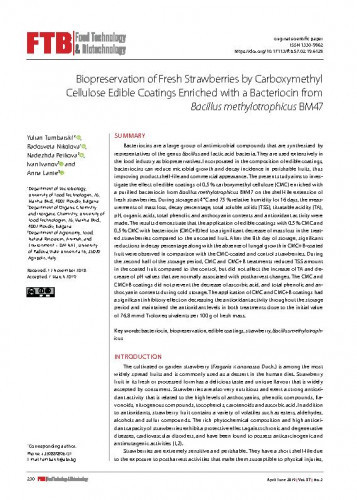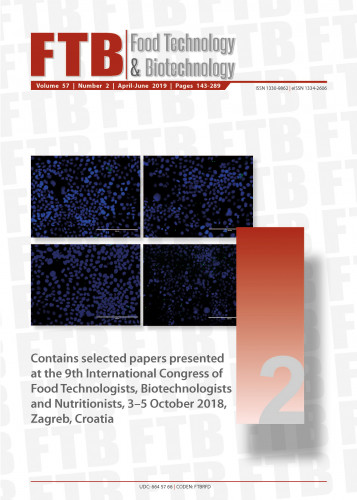Bacteriocins are a large group of antimicrobial compounds that are synthesized by representatives of the genus Bacillus and lactic acid bacteria. They are used extensively in the food industry as biopreservatives. Incorporated in the composition of edible coatings, bacteriocins can reduce microbial growth and decay incidence in perishable fruits, thus improving product shelf-life and commercial appearance. The present study aims to investigate the effect of edible coatings of 0.5 % carboxymethyl cellulose (CMC) enriched with a purified bacteriocin from Bacillus methylotrophicus BM47 on the shelf-life extension of fresh strawberries. During storage at 4 °C and 75 % relative humidity for 16 days, the measurements of mass loss, decay percentage, total soluble solids (TSS), titratable acidity (TA), pH, organic acids, total phenolic and anthocyanin contents and antioxidant activity were made. The results demonstrate that the application of edible coatings with 0.5 % CMC and 0.5 % CMC with bacteriocin (CMC+B) led to a significant decrease of mass loss in the treated strawberries compared to the uncoated fruit. After the 8th day of storage, significant reductions in decay percentage along with the absence of fungal growth in CMC+B-coated fruit were observed in comparison with the CMC-coated and control strawberries. During the second half of the storage period, CMC and CMC+B treatments reduced TSS amount in the coated fruit compared to the control, but did not affect the increase of TA and decrease of pH values that are normally associated with postharvest changes. The CMC and CMC+B coatings did not prevent the decrease of ascorbic acid, and total phenolic and anthocyanin contents during cold storage.; Bakteriocini obuhvaćaju veliku grupu antimikrobnih spojeva što ih sintetiziraju bakterije roda Bacillus i one mliječno-kiselog vrenja, a imaju vrlo široku primjenu kao biološki konzervansi u prehrambenoj industriji. Uklopljeni u jestivu prevlaku, bakteriocini mogu usporiti rast mikroorganizama i truljenje lako pokvarljivog voća, čime se produljuje trajnost i povećava komercijalna vrijednost plodova. Svrha je ovoga rada bila ispitati učinak jestive prevlake s 0,5 % karboksimetil-celuloze obogaćene pročišćenim bakteriocinom iz soja bakterije Bacillus methylotrophicus BM47 na produljenje trajnosti svježih jagoda. Tijekom skladištenja pri 4 °C i relativnoj vlažnosti od 75 % tijekom 16 dana, praćeni su sljedeći parametri: gubitak mase plodova, postotak trulih plodova, ukupni udjel topljive suhe tvari, titracijska kiselost, pH-vrijednost, udjeli organskih kiselina, fenolnih spojeva i antocijanina te antioksidacijska aktivnost. Rezultati pokazuju da se primjenom jestivih prevlaka s 0,5 % karboksimetil-celuloze i smjese 0,5 % karboksimetil-celuloze i bakteriocina bitno smanjio gubitak mase tretiranih jagoda, u usporedbi s netretiranim plodovima. Nakon osmog dana skladištenja primijećen je bitno manji postotak trulih plodova uz izostanak pojave plijesni na voću tretiranom smjesom 0,5 % karboksimetil-celuloze i bakteriocina, u usporedbi s kontrolnim uzorkom i onim tretiranim samo karboksimetil-celulozom.
Sažetak

 Food technology and biotechnology : journal of the Faculty of Food Technology and Biotechnology, University of Zagreb, Zagreb, Croatia : 57,2(2019) / editor-in-chief Vladimir Mrša.
Food technology and biotechnology : journal of the Faculty of Food Technology and Biotechnology, University of Zagreb, Zagreb, Croatia : 57,2(2019) / editor-in-chief Vladimir Mrša.